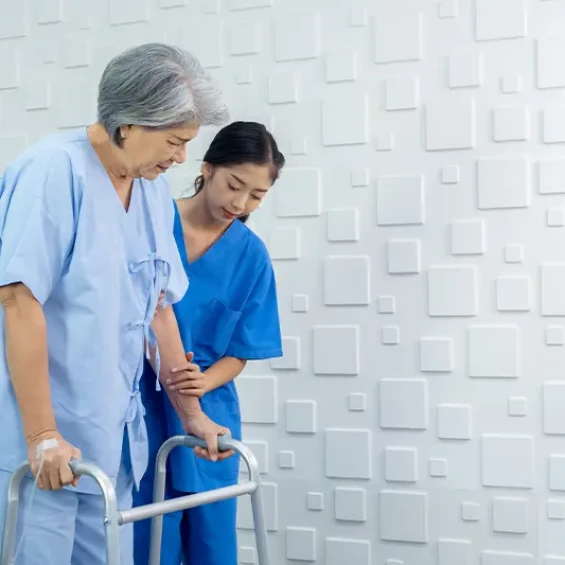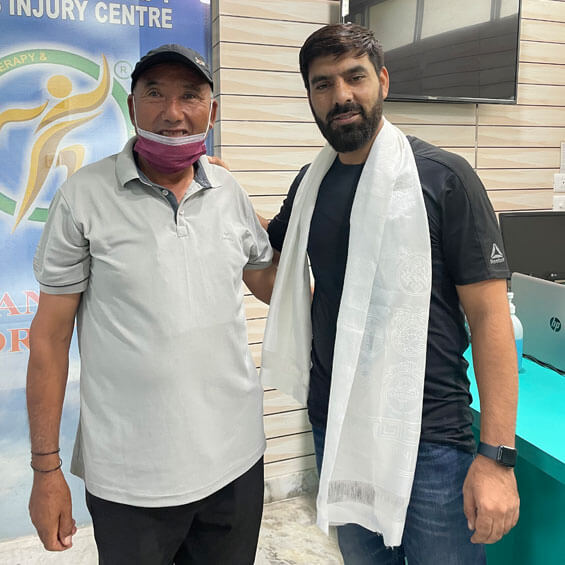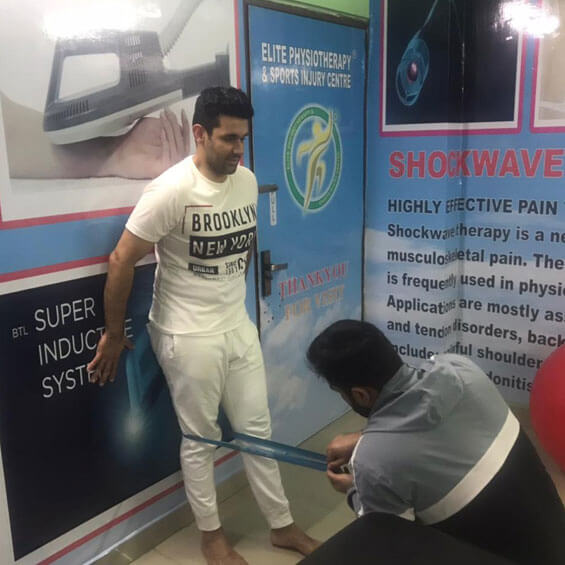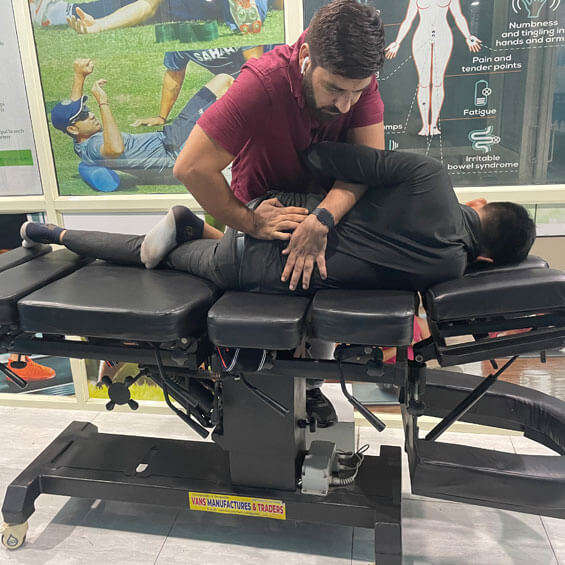Clinical Physiotherapy is a branch of healthcare that focuses on diagnosing, treating, and preventing a wide range of physical ailments and injuries through evidence-based practices. It involves personalized treatment plans that may include manual therapy, exercises, and modalities such as ultrasound or electrotherapy to restore movement and function. This patient-centric approach not only aims to alleviate pain and heal injuries but also educates individuals on how to maintain their health and prevent future problems. By working closely with patients in clinical settings, physiotherapists empower them to achieve their physical health goals, enhancing their overall quality of life and well-being.
Archives: Services
Post Type Description
Physiotherapist
Physical Therapy is a healthcare specialty focused on enhancing and restoring functional ability and quality of life to those with physical impairments or disabilities. Through a personalized approach, physical therapists assess and treat a variety of conditions across all age groups, employing techniques such as exercise, manual therapy, and modalities for pain management. This discipline emphasizes patient education, prevention, and rehabilitation, aiming to improve mobility, alleviate pain, and support patients in achieving their highest level of physical activity. Physical Therapy is a collaborative journey towards wellness, empowering individuals to actively participate in their recovery and maintain long-term health and independence.
Pediatric Physiotherapist
Pediatric physiotherapy is a dedicated branch of physiotherapy focusing on the unique needs of infants, children, and adolescents. It aims to support young patients in overcoming developmental, neuromuscular, and orthopedic challenges, facilitating optimal growth and functional independence. Through personalized treatment plans, which may include exercises, play-based therapy, and education, pediatric physiotherapists help improve mobility, strength, coordination, and balance. This specialized care is crucial for addressing congenital conditions, injuries, or diseases affecting children’s physical abilities. By fostering a supportive and engaging environment, pediatric physiotherapists empower young individuals to reach their full physical potential, enhancing their quality of life.
Ortho Physiotherapist
Musculoskeletal Physiotherapy is a specialized field focused on the treatment of injuries and conditions affecting muscles, bones, joints, ligaments, and tendons. It employs a holistic approach to diagnose, manage, and treat pain, injuries, and disorders in the musculoskeletal system, aiming to restore function and mobility. Through a combination of manual therapy, tailored exercises, and advice on posture and movement, musculoskeletal physiotherapists help patients recover from surgery, sports injuries, workplace and lifestyle-related ailments, and chronic conditions such as arthritis. This patient-centered care not only alleviates pain but also educates individuals on managing their conditions and preventing future injuries, promoting overall well-being and an active lifestyle.
Neuro Physiotherapist
Neuro physiotherapy is a specialized area of physiotherapy that targets conditions related to the nervous system. It focuses on assisting individuals who have suffered from neurological disorders or injuries, such as stroke, spinal cord injury, Parkinson’s disease, and multiple sclerosis, among others. Neuro physiotherapists employ a variety of techniques to enhance movement, balance, and coordination, aiming to improve patients’ quality of life. By tailoring rehabilitation programs to each person’s specific needs, they work to restore function, reduce symptoms, and increase independence in daily activities. This form of therapy plays a pivotal role in the recovery process, helping patients navigate the challenges associated with neurological conditions.
Geriatric Physiotherapist
Geriatric physiotherapy is a tailored branch of physiotherapy that specifically addresses the health concerns of elderly individuals. It aims to improve their quality of life by enhancing mobility, strength, balance, and overall physical function, which may decline with age. Geriatric physiotherapists employ a compassionate and comprehensive approach, creating personalized treatment plans that cater to the unique needs of each senior patient. These plans often include exercises, pain management strategies, and preventive measures to reduce the risk of falls. By promoting physical well-being, geriatric physiotherapy helps older adults maintain independence, recover from illnesses or surgeries, and manage chronic conditions more effectively, ensuring a more active and fulfilling life.
Ergonomics Consultant
The science of creating and organizing work environments, goods, and procedures to best suit the users’ needs is known as ergonomics. By lowering the chance of strain and injury, the objective is to improve well-being, efficiency, and safety. Ergonomics strives to maximize human well-being and total system performance by taking into account human capacities and constraints. This includes the investigation of human-environment interactions as well as the use of theory, principles, data, and design techniques to enhance both overall system performance and human well-being. The physical, cognitive, and organizational facets of human activity can all benefit from ergonomic design.
Cardiac Rehabilitation
Cardiac Rehabilitation is a comprehensive program tailored for individuals recovering from heart-related surgeries, disorders, or those at risk for cardiovascular diseases. It embodies a multidisciplinary approach, blending supervised exercise, lifestyle education, and emotional support to rebuild strength, prevent condition worsening, and enhance quality of life. By emphasizing heart-healthy living through diet modification, stress management, and physical activity, it aims to fortify the heart’s health and aid patients in regaining confidence in their daily activities. Cardiac Rehabilitation is a journey of empowerment, guiding individuals towards a sustainable, heart-conscious lifestyle, and providing them with the tools to navigate their health with knowledge and resilience.
Advanced Physiotherapy
Advanced physiotherapy encompasses cutting-edge techniques and technologies designed to enhance patient recovery and rehabilitation. This holistic approach integrates traditional physiotherapeutic methods with innovative interventions such as virtual reality, robotics, and tele-rehabilitation, tailoring treatments to individual needs. By employing evidence-based practices, advanced physiotherapy aims to optimize physical function, manage pain, and improve overall well-being across diverse populations, including athletes, the elderly, and those with chronic conditions or post-surgical recovery needs. Emphasizing patient education and self-management, it fosters independence and promotes long-term health benefits, embodying a forward-thinking perspective on rehabilitation and physiotherapy.
Chiropractor
Chiropractic care is an alternative healthcare approach focusing on the diagnosis and management of musculoskeletal system issues, predominantly concerning the spine. Chiropractors, the professionals who practice this method, utilize spinal adjustments and manipulations to help align the body properly, aiming to alleviate pain and bolster the body’s innate healing abilities. These manipulations, often performed manually, involve precise, swift pressure applied to a joint, extending it beyond its normal movement range. Beyond just adjustments, chiropractic treatment may encompass lifestyle guidance, dietary recommendations, and exercises to promote overall wellness and health.










